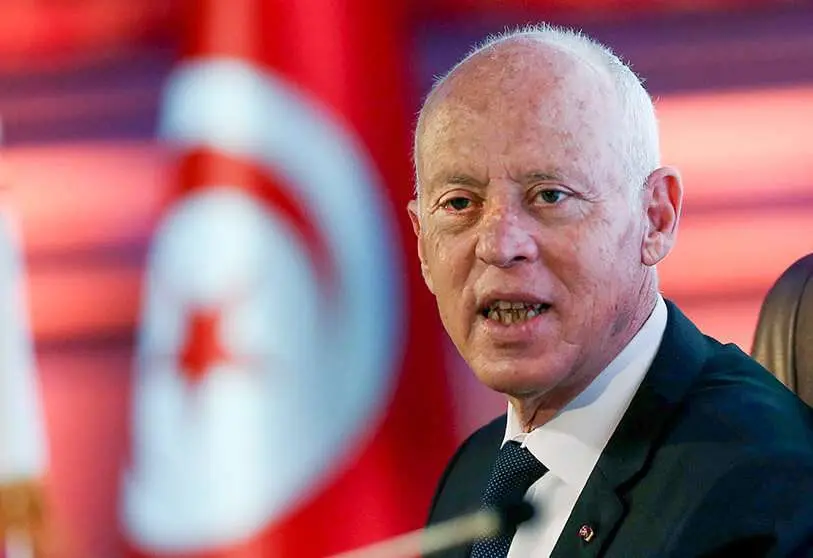Tunisia's new political context

On 25 July, the national day of the Republic, following a day of protests in which hundreds of people in several cities demanded the resignation of the government, Tunisian President Kais Saied announced in a televised speech the dismissal of Prime Minister Hichem Mechichi, the suspension of parliamentary activity for 30 days, and the concentration of practically all state powers in his hands. While many Tunisians fed up with the economic and health crisis celebrated the decision in the streets, most of the opposition, including the Islamist Ennahda party, the majority in parliament, denounced a "coup d'état".
In this regard, the Tunisian president has made his first appointment to a post by naming former national security adviser Ridha Gharsallaoui as Minister of the Interior, amid the country's complicated situation. Tunisia's presidency reported on its Twitter profile that the president has issued a presidential order to assign Gharsallaoui, a former national security adviser to the presidency. According to Tunisian news agency TAP, Saied stressed during the event that the appointment of the new interior minister aims to ensure the continuity of the state in this "very delicate" phase. "The state is not a puppet pulled by strings", he continued, stressing that it continues to be embodied by institutions that "work at the service of citizens and their interests, within the framework of the Constitution and the law".

Said acted on the basis of a highly questionable interpretation of Article 80 of the Constitution. He invoked Article 80 of the Constitution, which authorises the president to take "exceptional measures" in the event of "imminent danger to the country's institutions". Tunisian law specifies that, in order to invoke this rule, the entire process must be supervised by the Constitutional Court, which in Tunisia has yet to be created since 2015. Regardless of whether the factual situation - marked by a serious health and economic crisis, protests and a prolonged political deadlock - could be considered an imminent danger of this nature, it should be noted that the leader of Parliament claims not to have been consulted, the Constitutional Court provided for by the Magna Carta has not yet been constituted, and Parliament has been closed for 30 days.
The Islamist party, Ennahda, had formed a coalition government allied with the Islamo-nationalist Al-Karama movement, and the second most voted party, Qalb Tunis of media tycoon Nabil Karaoui, who was a presidential candidate in the 2019 elections and saw his aspirations thwarted when he was jailed for corruption. That coalition was at loggerheads for months with Saied, who was elected after the 2019 legislative elections that resulted in a parliament fragmented into a dozen parties and around 20 independents. The Islamist party Ennahda, which had 52 of the 217 seats in parliament, had been a key player in the negotiations to form a government - the third in just over a year - becoming the main support of Hichem Mechichi's government.

Kais Said, a 63-year-old retired professor of constitutional law. He is not a member of any political party and won the October 2019 presidential election in the second round with strong popular support: 72.71% of the vote. However, the head of government, Hichem Mechichi, obtained a large parliamentary majority to change 11 of the 25 portfolios - including interior, justice and health - but was rejected by the president of the Republic, Kaies Saied, who considered that he had not been consulted beforehand and that five of the new ministers were implicated in corruption and conflicts of interest.
Some ten days before Saied's presidential coup, the state prosecutor's office opened an investigation into alleged illegal financing of the Islamist party and the Qalb Tunis party. Also included in the investigation is the Aïch Tounsi movement, led by the French-Tunisian Olfa Terras, which has a deputy in parliament who has now been suspended. The suspicion, in all cases, is of "obtaining foreign funding for the electoral campaign and accepting funds of unknown origin" to finance it.

Shortly after the news broke, the influential Tunisian General Workers' Union (UGTT) called for a full audit of public finances and for the Central Bank to disclose financial transfers to parties and associations.
Three days after suspending the Parliament, the president took back a report published a decade earlier by the national commission of enquiry into the corruption and embezzlement committed during Ben Ali's regime, in which 460 people appear to have been involved in the embezzlement of up to 4 billion euros. In the midst of a serious economic crisis and in the midst of negotiations with the International Monetary Fund (IMF) for a new agreement - the fourth in the last decade - worth 3.3 billion euros, Said seeks to do "justice" but also to restore part of the state's coffers, which has a public debt of 100 per cent of its GDP.

The health crisis is the latest in a series of crises that have condensed popular unrest. On the verge of bankruptcy after ten years of endemic growth, and with poverty and unemployment rates on the rise, Tunisia is also dragged down by a serious political crisis that is at the root of the institutional conflict. Tunisian President Kais Said's decision to suspend parliament and dismiss Prime Minister Hichem Mechichi places Tunisia in a very serious constitutional crisis. This is the most delicate moment of the democratic transition that began after the triumph of the Arab Spring in 2011, which ushered in a democratic transition that has disappointed many citizens who have not had access to decent living conditions. Ten years on, many Tunisians are increasingly fed up with the government's management of poor public services and a political class that has repeatedly demonstrated its inability to govern coherently.










